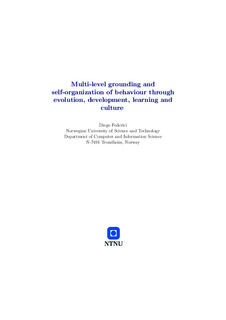| dc.contributor.author | Federici, Diego | nb_NO |
| dc.date.accessioned | 2014-12-19T13:30:27Z | |
| dc.date.available | 2014-12-19T13:30:27Z | |
| dc.date.created | 2005-03-11 | nb_NO |
| dc.date.issued | 2005 | nb_NO |
| dc.identifier | 126089 | nb_NO |
| dc.identifier.isbn | 82-471-6953-3 | nb_NO |
| dc.identifier.uri | http://hdl.handle.net/11250/249983 | |
| dc.description.abstract | The research topic of this PhD concerns the production of intelligent adaptive behaviour from the embodied perspective.
The intelligence seen in biological organisms arises as an emergent property of a complex system displaying multiple levels of adaptive mechanisms. At the bottom, slow changes to the genotype structure are mediated by natural selection. At the top, to cope with more transient factors, faster lifetime transformations are found.
Lifetime adaptation also takes place at various levels, from the processes that are responsible for the organism construction and maintenance, to the regulation of behaviour based on instinctive responses, cognitive abilities and social interactions.
The traditional GOFAI (Good Old Fashion Artificial Intelligence) stand is based on the view of intelligence as computation taking place on a internal symbolic representations of the outside world. Powered by deductive logic, the classical artificial reasoner is centered on the possibility to describe reality within a symbolic framework. Unfortunately, this approach fails to cope with the ambiguous nature of reality, where good decisions are often based on partial and inconsistent knowledge. In these cases, reasoning could appear irrational, while its rationale is actually found in the necessity to take action.
To solve this problem, New AI hypothesizes that intelligent behaviour must be understood within the framework provided by the agent’s physical interactions with the environment: subjective sensations and bodily interactions.
The result is a bottom-up exploration, which starts from the lowest adaptive mechanisms to reach the topmost cognitive abilities. The work presented in this thesis follows this hypothesis, analyzing multiple levels of adaptive mechanisms: evolution, development, learning and culture. | nb_NO |
| dc.language | eng | nb_NO |
| dc.publisher | Fakultet for informasjonsteknologi, matematikk og elektroteknikk | nb_NO |
| dc.relation.ispartofseries | Doktoravhandlinger ved NTNU, 1503-8181; 2005:43 | nb_NO |
| dc.relation.haspart | Federici, Diego; Downing, Keith. Evolution and development of a multi-cellular organism: scalability, resilience and neutral complexification. Artificial Life. 12(3): 381-409, 2006. | nb_NO |
| dc.subject | Kunstig intelligens | no_NO |
| dc.title | Multi-level grounding and self-organization of behaviour through evolution, development, learning and culture | nb_NO |
| dc.type | Doctoral thesis | nb_NO |
| dc.contributor.department | Norges teknisk-naturvitenskapelige universitet, Fakultet for informasjonsteknologi, matematikk og elektroteknikk, Institutt for datateknikk og informasjonsvitenskap | nb_NO |
| dc.description.degree | dr.ing. | nb_NO |
| dc.description.degree | dr.ing. | en_GB |
